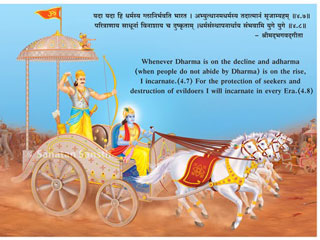Ayurveda for a healthy life ! – 17/2023

Chapter 11
Place and food
1. Effect of place on the quality and digestibility of food
The places which are considered are –
1A. Place where the food is grown : The place where the food
is grown affects the quality of the food, e.g., wheat grown in the Himalayas will be heavy, whereas wheat grown in Rajasthan will be light. Meat of animals living in the forest, i.e., in a dry climate, will be light whereas that of aquatic animals, e.g., in a moist climate near the sea, will be heavy.
1B. Place where a person has spent his childhood : This factor is important as a person born in Goa is used to rice, whereas a person born in Punjab is used to wheat. A person naturally gets habituated to the food items grown in his region. Wheat grown in USA may be unsuitable for Indians and vice versa.
1C. Place where the food is eaten : A person residing in a dry climate, i.e., in a forest will have more dryness of the body, which will be partly neutralised by food grown in the wet region or meat of aquatic animals. Thus, in general, food should have the qualities which will nullify the effects due to the climatic conditions, in the particular region.
2. Time (Kal) and food
Time is discussed as under.
2A. Effects of time on food : Kal (time) is also called parinama (Change). A substance undergoes a constant change every second, e.g., cereals and pulses are heavy to digest when they are less than a year old. After one year, they are light to digest. Wine becomes light and more effective with age. Cooked food becomes stale the next day. These changes in the qualities of substances can be attributed only to time.
2B. Natural time for eating food : When the diet taken previously is digested and utilised, one gets a natural urge to eat, i.e., hunger. The signs which show this areas here.
1. One feels hungry.
2. A feeling of emptiness in the stomach.
3. The body, stomach and the sense organs feel light and clean.
4. The previous food is digested.
5. The digestive tract and juices are ready to receive food.
6. Belching is pure and without any associated smell or taste.
7. One has evacuated the bowels and bladder and has passed flatus properly.
8. The three doshas namely, Vata, Pitta and Kapha are functioning properly at their appropriate site.
If one does not eat food at the right time but eats it earlier or later, the food is not digested properly.
2C. False hunger : When one is used to eating food at a particular time, one feels hungry at that time. This may not be natural as one may not really be hungry if one has eaten in excess or heavy food previously.
Similarly, when one sees a savoury food item such as bhel or pakoda, one feels like eating it even when one’s stomach is full.
2D. Time of the day for eating food : Normally a healthy person should take his lunch at 12.00 noon. At this time, the previous food is well digested and the digestive power is naturally at its best. One should have dinner after about one to three hours after sunset, i.e., 6 p.m. to 9 p.m. The evening meal should be comparatively lighter than the lunch. The indicated diet taken at the appropriate time does not cause indigestion and promotes health and happiness.
People suffering from fever or convalescing following fever, should take a light diet in the evening.
An adult should never take any food within three hours of lunch or dinner. Men involved in physical work should not remain without food, for more than six hours. If the lunch is not well digested, then too one should take a very light dinner. However, if dinner is not well digested, one should postpone or skip one’s lunch. One should never take food late at night, midnight or early morning.
2E. Season and food : During winter, the digestive power is good and one can digest even heavy food easily. Due to early sunset, one takes dinner early and hence one should take a good breakfast early in the morning.
In summer, one should take a light and sweet diet as the digestive power is weak and Vata is increased. In general, the food that we eat should nullify the effect of the season on man.
For details of selection of food in various seasons, refer to the Chapter on seasons.
2F. Stage of a disease and food : The diet advised in various stages of a disease differs, e.g., fasting is indicated in the ama stage of fever. In srotorodha kamala, i.e., obstructive phase of infective hepatitis, light, pungent, sour and salty food is indicated whereas the same food is contraindicated when the stage of obstruction is over; instead one should take sweet food items.
If one eats food earlier than the appropriate time, one suffers from indigestion. If one takes food later, hunger and digestive power dwindle and the food is digested after a long time.
Before eating, a person should consider which food he can tolerate and which he cannot; what is good for him and what is not.
3. Tolerance and intolerance (Satmya and Asatmya)
3A. Tolerance (Satmya) : A substance which is well tolerated and utilised by the body, is called satmya. Substances which are not tolerated and give rise to hypersensitivity, toxic or allergic reactions, even when taken in an appropriate dose, are called asatmya.
Satmya is classified as pravara, avara and madhyama according to the number of tastes tolerated by a person.
1. Pravara satmya (Good tolerance) : Individuals with pravara satmya, can tolerate all the six tastes and can digest all types of food items. They are used to taking milk, ghee, oil, meat, etc. daily. They can tolerate exertion well and enjoy a long and healthy life.
2. Avara satmya (Poor tolerance) : These individuals can tolerate, utilise and consume food items with only one taste.
They are weak, cannot tolerate physical exertion and have a short lifespan.
3. Madhyama satmya (Moderate tolerance) : Such people can tolerate food items with two to five tastes and usually have medium strength and a medium lifespan.
4. Oakasatmya (Tolerance after constant use) : A food item which is not easily tolerated initially, is gradually tolerated when taken daily in a small quantity. This is called oakasatmya, e.g., a person used to a vegetarian diet getting slowly used to a non-vegetarian diet.
5. Jatisatmya (Tolerance in a species) : Some substances are naturally tolerated and are food for a particular species of animals, e.g., grass is Jatisatmya for cows, but not for man.
6. Deshasatmya (Tolerance according to the place or region) : Dry food is well tolerated in a wet region.
7. Rutusatmya (Tolerance according to the season) : A sweet and light diet is well tolerated in summer.
8. Prakrutisatmya (Tolerance according to the constitution) : A person with a Vata constitution, tolerates oily and hot food. A person with a Pitta constitution tolerates a cold climate and cold food items and drinks.
9. Vayasatmya (Tolerance according to the age) : A new-born baby tolerates breast milk, but cannot tolerate solid food.
10. Vyadhisatmya (Tolerance in a disease) : The various recommendations and restrictions of diet described in a disease, represent the food which is tolerated, and that which is not tolerated in a particular disease.
3B. Intolerance (Asatmya)
1. After consuming asatmya food items, harmful effects are seen on the body. Some food items such as salts, ksharas, pippali and all medicines are never tolerated by the body in a large quantity and one never gets used to them, even after a prolonged use. Hence, one should always avoid excessive use of these substances.
Intolerance is also classified as –
Tivra asatmya (Severe intolerance)
Madhyama asatmya (Moderate intolerance)
Avara asatmya (Mild intolerance)
2. Dravya asatmya (Allergy) : A substance or medicine though well-tolerated by most people, may produce toxic manifestations such as rash, breathlessness, pain in the stomach, etc. in a particular person. Such a person is said to be allergic to that substance. One, who is allergic to eggs, gets rash on eating even
a small piece of cake containing egg.
Hence, one should select food and drugs after considering one’s constitution, tolerance, digestive power and that which is beneficial or harmful to self.

 Radiant Thoughts of Sachchidananda Parabrahman (Dr) Jayant Athavale
Radiant Thoughts of Sachchidananda Parabrahman (Dr) Jayant Athavale Law banning Conversion of Religion is against Individual Freedom : Babbles Former Judge S Muralidhar
Law banning Conversion of Religion is against Individual Freedom : Babbles Former Judge S Muralidhar Editorial : Khalistan, Balochistan and Pakistan
Editorial : Khalistan, Balochistan and Pakistan After India becomes a ‘Hindu Rashtra’, Russia will embrace Hinduism and spread it globally : Nostradamus’ Prophecy
After India becomes a ‘Hindu Rashtra’, Russia will embrace Hinduism and spread it globally : Nostradamus’ Prophecy ‘Halt Public Spending on Aurangzeb’s Tomb, Prioritise Maharashtra’s Heritage’ : HJS
‘Halt Public Spending on Aurangzeb’s Tomb, Prioritise Maharashtra’s Heritage’ : HJS Noise Pollution, Loudspeakers, and the Law
Noise Pollution, Loudspeakers, and the Law